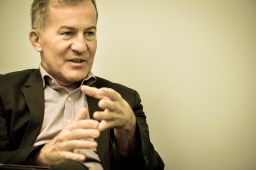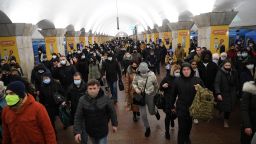Editor’s Note: Michael Bociurkiw (@WorldAffairsPro) is a global affairs analyst. He is a senior fellow at the Atlantic Council and a former spokesperson for the Organization for Security and Cooperation in Europe. He is a regular contributor to CNN Opinion. The opinions expressed in this commentary are his own. View more opinion at CNN.
Just before daylight Thursday, I woke up in this historic city to the nonstop buzzing of alerts on my mobile phone. The Russian invasion of Ukraine that had been predicted for days was finally underway.

The streets were empty and quiet but as the first rays of daylight emerged, anxiety and fear had begun to take hold: air raid sirens blared across the fortresses, churches and quaint cobblestone streets of Ukraine’s cultural capital. A male voice instructed people to shelter in place and turn off their gas connections. People started to form long lines at bank cash machines and head to the markets while they were still open.
Just after lunchtime, I witnessed a convoy of Canadian Embassy vehicles exit the historic center of Lviv, where a large contingent of diplomats had set up shop after being evacuated from Kyiv. One senior diplomat I saw was so distraught she could hardly speak.
War has officially come to Ukraine, almost eight years to the day after a popular uprising called the Revolution of Dignity toppled the Russian-backed regime of Viktor Yanukovych. Dozens of brave souls were gunned down by his failing government in February 2014 – and it now appears that fresh killing fields on Ukrainian soil are being created by troops ordered in by Russian President Vladimir Putin, who seems intent, at any cost, of redrawing the security map of Europe.
While the full-scale invasion may have shocked some Western leaders, judging from my conversations early Thursday in and around Lviv, the least surprised were the Ukrainians themselves, expressing an “I told you so” attitude.
Ukrainians always knew the sanctions threatened by the West were going to be too weak, and not go far enough in deterring this awful reality.
Ukrainian President Volodymyr Zelensky had been begging the West for weeks to unleash the searing sanctions of which leaders in Washington, Ottawa, London and elsewhere had spoken about with blustering swagger. But, in the end, the long table, shuttle diplomacy had failed to deter Putin, as did the belated suspension of Russia’s controversial, multibillion-dollar Nord Stream 2 pipeline.
In New York, the United Nations – an institution crafted to deter another world war – responded with tough rhetoric but will, in the end, be judged as toothless because Russia has veto power over any Security Council action. At the start of an emergency meeting of its Security Council – a forum routinely mocked by a succession of Russian diplomats – Secretary-General António Guterres said: “President Putin, stop your troops from attacking Ukraine, give peace a chance.”
Predictably, the Russian aggression prompted many residents of Kyiv and elsewhere to flee for safer ground, creating huge traffic jams.
As the full force of invasion unfolds, the humanitarian crisis will be felt deeply. By 3pm local time Thursday, European Commission chief Ursula von der Leyen declared at a news conference with NATO chief Jens Stoltenberg that the EU will “make it as difficult as possible” for the Kremlin to pursue its “aggressive actions” in Ukraine.
The burden of those fleeing Ukraine seeking safety could be huge. Neighboring countries are already preparing to receive an influx of refugees. Israel estimates that there could be as many as 5 million asylum seekers from Ukraine overall, according to the Times of Israel.
Get our free weekly newsletter
After the debacle over ineffective and harmful EU border closures as a result of the Covid-19 pandemic, there should be legitimate concerns of some EU member states dissenting from Brussels on the question of allowing Ukrainian asylum seekers in (however, a German minister said Berlin would help neighbors if there was a “large-scale influx” of refugees).
Still, Russian troops and heavy weapons are on Ukrainian soil at this moment, threatening many major cities and, in a wider context, threatening to cause a seismic shift to the world order.
Putin’s ruthless aggression has brought us to this moment. And now that the West’s effort to deter Putin has failed, Ukrainians are the ones bearing the consequences. They are fighting for their lives.


